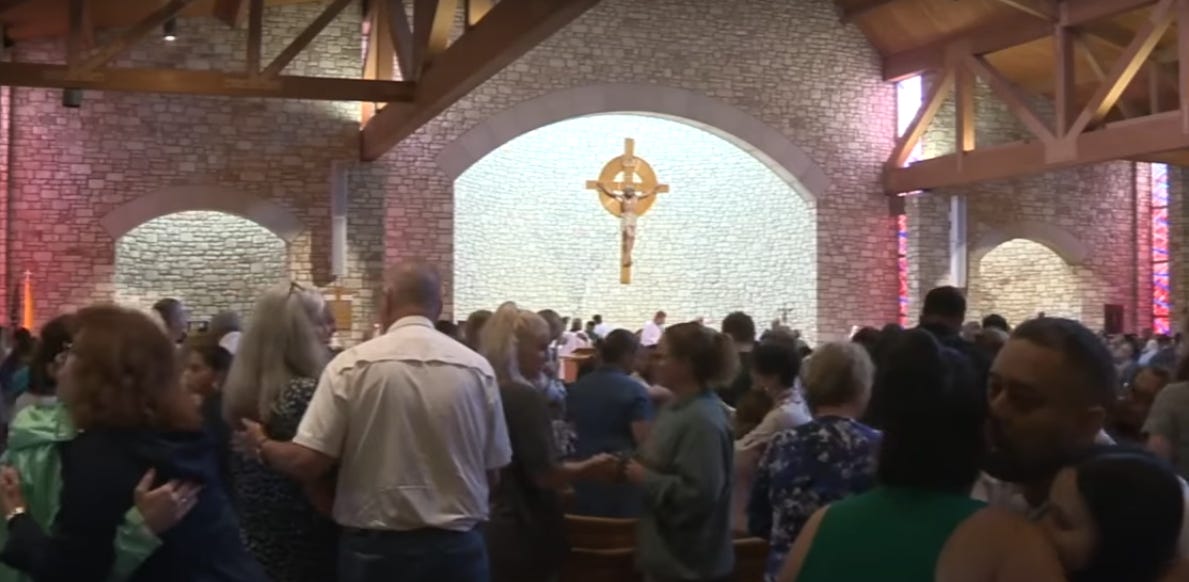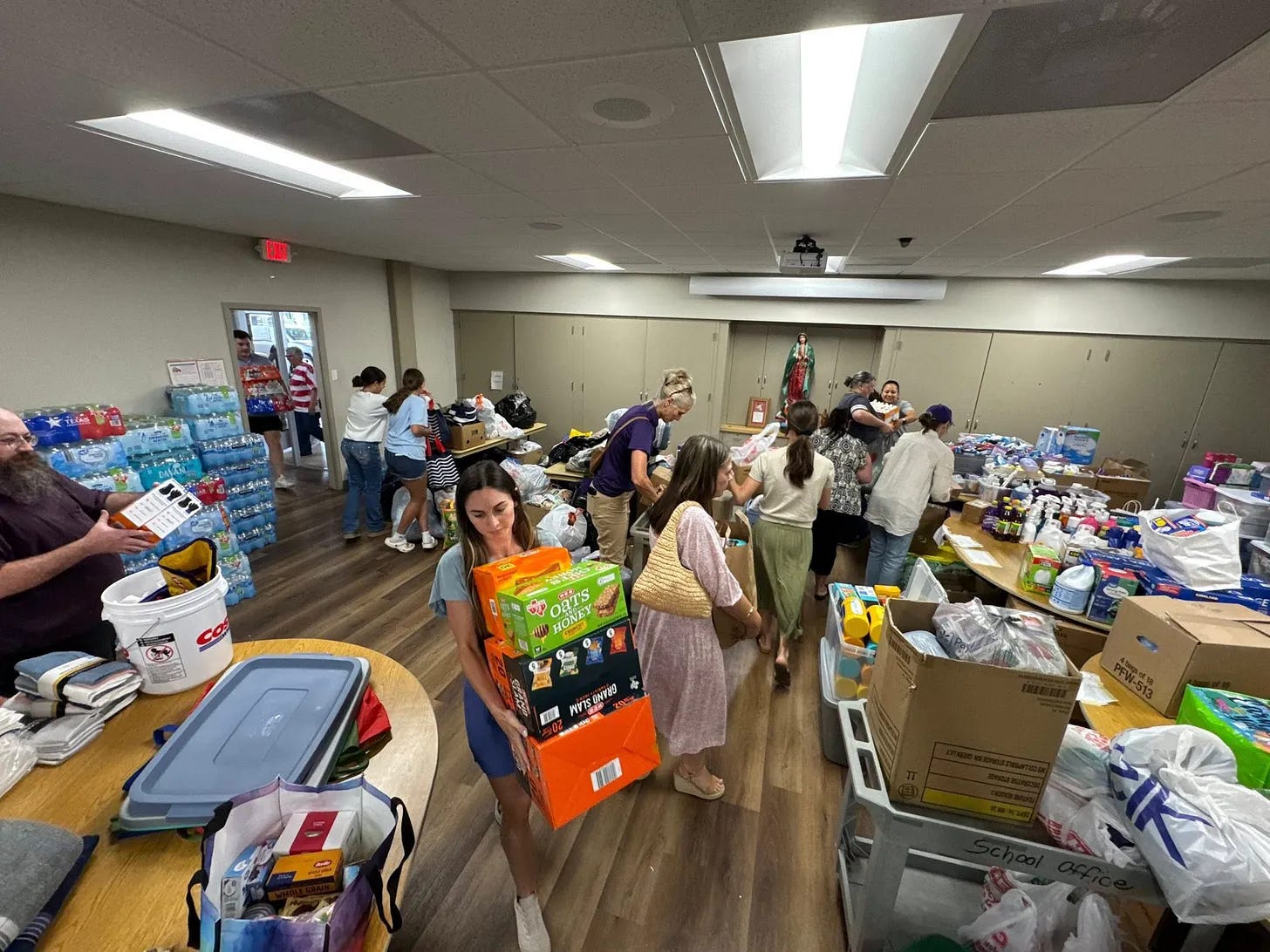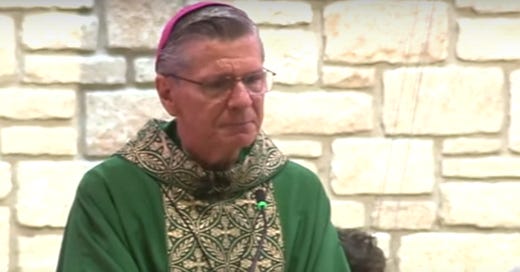"There are no satisfying answers now, and healing to our wounds is far away."
In a homily and interview, San Antonio's archbishop speaks words of wisdom after Texas floods that have killed more than 100 people.

This story has been updated.
By Gary Gately
At Notre Dame Catholic Church in Kerrville, along the Guadalupe River in Texas Hill Country, San Antonio Archbishop Gustavo García-Siller choked back tears as he gazed into the faces of the faithful.
“There are no satisfying answers now, and healing to our wounds is far away,” Archbishop García-Siller said in his homily at a Mass Sunday after one of the deadliest U.S. floods in a century claimed more than 100 lives in Central Texas.
“Lord, your people are mourning this morning. This Eucharist, our Sunday Mass, takes place in the context of the national disaster that has caused so much uncertainty, pain, and suffering to so many families with the floods along our river, our beloved river.”
The Mexico-born Archbishop García-Siller’s homily came as authorities confirmed that at least 68 of those who died, including 28 children, were from Kerrville and surrounding Kerr County.
In an interview with The Catholic Observer Monday, Archbishop García-Siller recalled the heartbreak and torrents of tears as families that gathered in a Kerrville school gym Friday night learned that the flooding had claimed loved ones or that they remained missing.
“Many people ask at a time like this, in a time of tragedy: ‘Where was God? Where is God?’” he said. “Even I, when I went there Friday night, I couldn’t imagine what was going on in these families’ minds. It can be such an overwhelming experience. You can see their sorrow, their pain in their faces, in their eyes. You’re stunned. You don’t know what to do. You feel that vulnerability, that we really don’t have much control over life. We think we do, but we don’t.”
To a journalist who has covered too many deadly tragedies — hurricanes, tornadoes, floods, mass shootings — Archbishop García-Siller’s words ring true, genuine, heartfelt. Not the same old quick, dismissive “thoughts and prayers” cliches, or, worse, that it was God’s will for raging floodwaters before dawn on the Fourth of July to kill more than 100 people, dozens of them children
“We should avoid in situations like this to think that I have the answers,” Archbishop García-Siller said. “I don’t have to try to come up with any great wisdom — no, no, no — but to express closeness and be present to these hurting people, to bring compassion to them, to bear the cross with them, to convey that we are listening to the cry of all those who suffer that their cry is not falling on deaf ears.
“We allow God, who truly has the answers, God, who moves the minds and the hearts and the wills of people to use us in ways beyond our understanding, and know that when God wants to communicate, God will communicate what God wants to express.”
Even Jesus, the archbishop reminds us, cried out on the cross: “My God, my God, why have you forsaken me?”
So it’s certainly not wrong for humans to feel that God has abandoned us in times of suffering or to express our anger, Archbishop García-Siller said.
“Sure, we can scream to God or at God, and if anybody understands what we’re feeling, it is God,” he added. “God embraces every cry when we’re screaming out, ‘No, no, no!’ God is there with us and in time, we will be able to see the presence of the Lord. Those of us who are not in pain in these moments, we are the ones called to love, to care, to bring hope to the truly suffering.”
And, as the archbishop said in his homily Sunday: “Your people have faith, strong faith, Lord, and love for you and one another and cry out to you. We are before the cross these days. We are bearing it, but uniting ourselves to Christ's self-giving love.
“The cross is no mere relic. It is the sustenance that nourishes our faith. Pain and sorrow and death do not have the last word, but goodness, truth, love, care and hope never die.”

Meanwhile, Camp Mystic, an all-girls, Christian summer camp on the banks of the Guadalupe River, confirmed Monday that 27 children and staffers died in the flash floods. Richard Eastland, the camp’s director, died after being swept away by floodwaters while trying to rescue campers, authorities said.
“Our hearts are broken alongside our families that are enduring this unimaginable tragedy. We are praying for them constantly,” the camp said on its website.

The flash floods also claimed the lives of two sisters from St. Rita’s Catholic School in Dallas, who died while on a family trip with their parents and grandparents to a cabin near the Guadalupe River. Blair Harber, 13, and Brooke Harber, 11, died clutching each others’ hands after the river swept away their cabin, and their grandparents remained missing, relatives and the school said.
As floodwaters filled the cabin, the girls’ aunt, Jennifer Harber, wrote on a GoFundMe page to raise money for the family: “Brooke texted my brother [her father], her grandmother and grandfather on Annie’s side, saying ‘I love you’ at 3:30 a.m. Blair and I had a conversation about God and heaven two weeks earlier. They had their rosaries with them.”
In a statement on its website, St. Rita’s Catholic School said: “In this time of deep sorrow, we stay grounded in our faith and united in love. We will stand with the Harber family in the days to come, surrounding them with our prayers, compassion, and unwavering support. As a community of faith, we hold onto the hope and promise that Christ has defeated death, and that eternal life is waiting for those who love Him.”
For his part, Pope Leo XIV offered prayers for the victims of the floods Sunday.
“I would like to express sincere condolences to all the families who have lost loved ones, in particular their daughters, who were at the summer camp, in the disaster caused by flooding of the Guadalupe River in Texas in the United States,” the U.S.-born pope said, adding, “We pray for them.”
And Texas Governor Greg Abbott, who is Catholic, declared Sunday as a Day of Prayer throughout the state.
“Texans are known for their faith, strength, and resilience,” Abbott said “Even as floodwaters raged, neighbors rushed in to rescue, comfort, and bring hope. In times of loss, we turn to God for comfort, healing, and strength. I urge every Texan to join me in prayer this Sunday—for the lives lost, for those still missing, for the recovery of our communities, and for the safety of those on the front lines.”

Catholic Charities of the Archdiocese of San Antonio is accepting donations to help families affected by the flooding.



